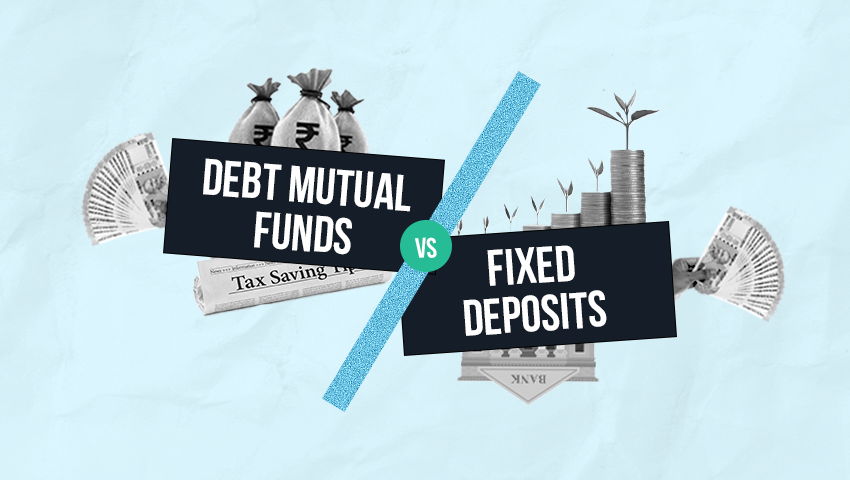
- 22/03/2025
- MyFinanceGyan
- 173 Views
- 3 Likes
- Mutual Fund, Finance, Investment
Debt Mutual Funds vs Fixed Deposits: A Comprehensive Comparison
When it comes to safe and conservative investment options, Debt Mutual Funds and Fixed Deposits (FDs) are among the most popular choices for investors. Each option has unique features, benefits, and limitations, making it crucial to understand their differences before making an investment decision.
This blog provides an in-depth comparison of Debt Mutual Funds vs Fixed Deposits, analyzing key factors such as returns, risk, liquidity, tax implications, and more to help you make an informed choice.
Understanding Fixed Deposits:
Fixed Deposits (FDs), also known as term deposits, are investment instruments offered by banks and financial institutions. Investors deposit a lump sum amount for a fixed tenure at a predetermined interest rate, ensuring stable and guaranteed returns. FDs are low-risk investments ideal for individuals seeking security and consistent returns.
Understanding Debt Mutual Funds:
Debt Mutual Funds primarily invest in fixed-income securities such as corporate bonds, government securities, treasury bills, and money market instruments. These funds aim to provide steady returns over time, often outperforming traditional savings accounts and FDs. Although relatively low-risk, they are still subject to market fluctuations.
Debt Mutual Funds vs Fixed Deposits: A Comparative Analysis:
Both Debt Funds and Fixed Deposits cater to different financial goals and risk appetites. Here’s a detailed comparison:
Risk and Returns
- Debt Mutual Funds: Offer returns in the range of 7-8%, depending on market conditions. During favorable market scenarios, they can outperform FDs, but they carry moderate risk due to bond price fluctuations.
- Fixed Deposits: Provide stable, guaranteed returns of approximately 6-7% per annum, independent of market volatility, making them a low-risk investment option.
Liquidity
- Debt Mutual Funds: Highly liquid and can be redeemed anytime. However, some funds impose an exit load on early withdrawals.
- Fixed Deposits: Less flexible, as premature withdrawals often attract a penalty ranging from 0.5% to 2%.
Tax Efficiency
- Debt Mutual Funds: Taxed based on the investor’s income tax slab. Previously, debt funds enjoyed tax advantages, but recent tax reforms have reduced their benefits.
- Fixed Deposits: Interest earned is fully taxable as per the investor’s income tax slab, making them less tax-efficient.
Key Differences Between Debt Funds and Fixed Deposits:
The table below highlights the differences to help you determine which investment suits your needs better:
Conclusion:
Both Debt Mutual Funds and Fixed Deposits serve as viable investment choices, depending on individual financial goals and risk tolerance.
- Fixed Deposits are ideal for conservative investors looking for guaranteed returns with minimal risk.
- Debt Mutual Funds are better suited for those willing to accept some market-related risks in exchange for potentially higher returns.
With recent tax changes affecting both investment options, selecting the right one depends on factors such as tax bracket, investment horizon, and liquidity needs. A well-balanced investment portfolio may incorporate both instruments to achieve financial stability and growth.
Disclaimer: The views expressed in this blog are for informational and educational purposes only. They do not constitute financial advice or product recommendations.



